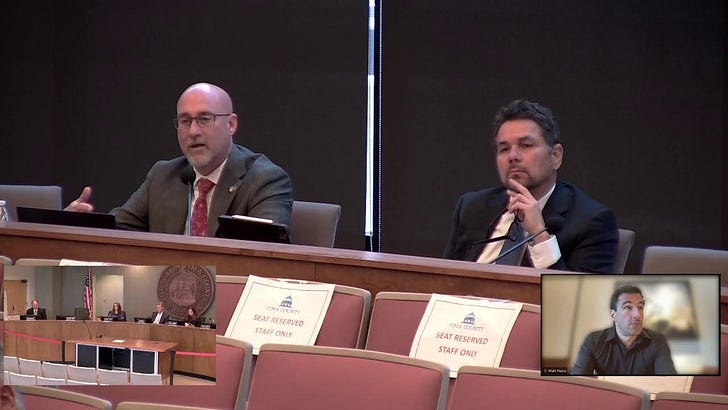Unseen contract gets green light
Public left out of process ... Christy not happy about it ... And birds of a feather flock together.
The Pima County supervisors had two years to set up an orderly process for approving County Administrator Jan Lesher’s new contract before her old one expired yesterday.
But when it came time to approve the contract for the county’s highest-paid employee on Tuesday, they didn’t give the public any time to look it over before voting – as we pointed out on Monday – and couldn’t answer a simple question about how much it will ultimately cost taxpayers.
And she never had a performance evaluation, supervisors acknowledged at the meeting.
A slim majority of the board backed the new, two-year employment contract for Lesher, but most of the details are still under wraps, other than it looks like she is going to get a $70,000 annual raise.
A press release from the County hours after the meeting added Lesher will also receive an annual vehicle allowance of $6,600 and $31,000 per year in deferred compensation. The county did not release the new contract.
Supervisor Steve Christy – who boycotted the executive session discussion of the contract in protest – was quickly rebuffed by Supervisor Adelita Grijalva during the meeting when he asked her to read the new contract out loud before the vote.
Grijalva said the contract was finalized during the executive session and she wanted to give staff time to calculate the value of Lesher’s salary increase and her yet-to-be-disclosed new benefits.
“If I am going to put out any information, I want it to be accurate,” Grijalva said.
The board approved a $330,000 annual base salary for Lesher and an option to renew for two more years.
The public still doesn’t know other details about her compensation, including whether she will get a one-time cash payout for unused sick or vacation time, like her old contract required.
It’s also unclear whether she will get any automatic raises over the next two years, how much vacation time she will get, or what the terms are if either Lesher or the supervisors decide to end the contract.
Supervisors Rex Scott, Jennifer Allen, and Grijalva voted to approve the contract, while Christy, the lone Republican on the board, voted against it and Supervisor Matt Heinz abstained, saying he wanted to pay her more. Her $330,000 annual salary will make her the top-paid county administrator in the state.
Lesher told the Tucson Sentinel she plans to stay on for two years and then step away from the job, adding “the days of anyone serving for 30-plus years are over.”
We’d like nothing more than to serve as reporters for 30-plus years. Thanks to our paid subscribers, we’re well on our way!
Christy was deeply critical of the decision not to put up a draft version of the contract before the meeting, saying it went against the basic tenets of government transparency.
“It seems like it is being hid from the public,” Christy said. “There is a certain element of duress to approve this County Administrator’s contract on the day the current contract expires.”
Christy asked his colleagues to postpone the vote after the executive session to give the public a chance to weigh in. None of his colleagues on the board responded to his request.
Prior to the executive session, Chief Civil Deputy County Attorney Sam Brown defended the decision not to post the contract, specifically stating that the county did not violate open meeting laws.
He argued that a final version of the contract couldn’t be posted before the vote on Tuesday because the details were still going to be hammered out in executive session.
Scott admitted that there was a draft of the contract available at least a week ago when he asked that Lesher’s contract be put on the agenda, but said that he opted to post Lesher’s now-expired contract instead after consulting with Brown.
Despite the protests that this was the only way to negotiate her contract, that is not how the county handled it in the past.
On December 30, 2020, then-County Administrator Chuck Huckelberry authored and published a memo asking for a $13,000 annual raise. The memo also contained a draft copy of his contract that would be discussed at the January 5, 2021 meeting.
And while it took another two weeks for the Board to finalize his contract, the public had ample time to review it.
The one nugget to take away from Tucson Mayor Regina Romero’s annual State of the City address on Tuesday might be a number: $27 million.
Romero uses the number to illustrate the amount the city lost in revenue in a single year – blaming the state tax policies backed by former Gov. Doug Ducey.
With Republicans in control of the state Legislature, Romero says the city is bracing for even bigger cuts in the coming years.
She says the city has listened to the community about the lack of affordable housing, increases in the crime rate, the opioid/fentanyl crisis, and a spike in homelessness in Tucson. City officials launched innovative, collaborative programs but there is more work to do.
Her answer is Proposition 414, the “Safe and Vibrant City” half-cent sales tax measure that goes before the voters in two months.
“We are asking voters to invest in their own safety,” Romero told reporters on Tuesday after her address.
The Tucson Metro Chamber has already taken aim at Prop 414, saying it is unfocused, costs too much and is being used to continue new programs that had been funded by one-time federal COVID grants. The proposition also is the top target of Kathleen Winn, who recently took the reins of the Pima County Republican Party.
Housing advocates also decry the amount set aside for housing, saying the city would funnel way too much of the estimated $800 million generated over the next 10 years to law enforcement.
Every drop counts: As Tucson officials look for ways to conserve water, they are moving ahead with a plan to spend $87 million in federal funds on a toilet-to-tap facility, the Arizona Daily Star’s Charles Borla reports. The Tucson City Council approved the plan unanimously at their meeting Tuesday, setting in motion a project that by 2032 will convert 2.5 million gallons daily (about 2% of the city’s total consumption) from treated wastewater to potable water.
New mayor in town: The Marana Town Council appointed Jon Post as mayor on Tuesday, filling a seat left vacant when longtime Mayor Ed Honea died in November, KGUN’s Madison Thomas reports. Post already was serving as vice mayor, a post he’s held since 2013, and he’ll stay on as mayor until a special election in 2026.
Troubling uptick: Homicides went up in Tucson last year, but stayed below the recent peak in 2021, Arizona Public Media’s Zachary Ziegler reports. The Tucson Police Department reported 66 homicides in 2024. That total was 13 more than 2023, but fewer than the 77 in 2021.
Wearing them out: Before migrants reach the U.S.-Mexico border, they have to navigate Mexico’s immigration enforcement policies. Lately, those policies include Mexican officials picking up migrants and dropping them off in areas throughout Mexico, as long as it’s far from the border, the Associated Press’ Antonio Castillo and Maria Verza report. The policy of “dispersion and exhaustion” is aimed at breaking up caravans and wearing out migrants before they make it to the border, with the goal of appeasing U.S. officials like incoming President Donald Trump.
“They left us dumped here without any way to get out. They won’t sell us (bus) tickets, they won’t sell us anything,” Ender Antonio Castañeda, a 28-year-old Venezuelan staying in Acapulco, told the AP.
There’s a new lawmaker in town. Well, not really. Rep. Rachel Jones just changed her name after she married Seth Keshel, the favorite election predictor of Donald Trump. Keshel wrote a whole newsletter about Jones in 2023 as he was “vetting candidates for election integrity-specific Candidate Spotlights.” He didn’t say whether the two were involved at the time, but they got married after he testified about election fraud at the Arizona Capitol and Jones recently changed her name on the Legislature website.










Did the supervisors give a clear reason why they chose to act in a nontransparent fashion on the administrator's contract? They knew the deadline.